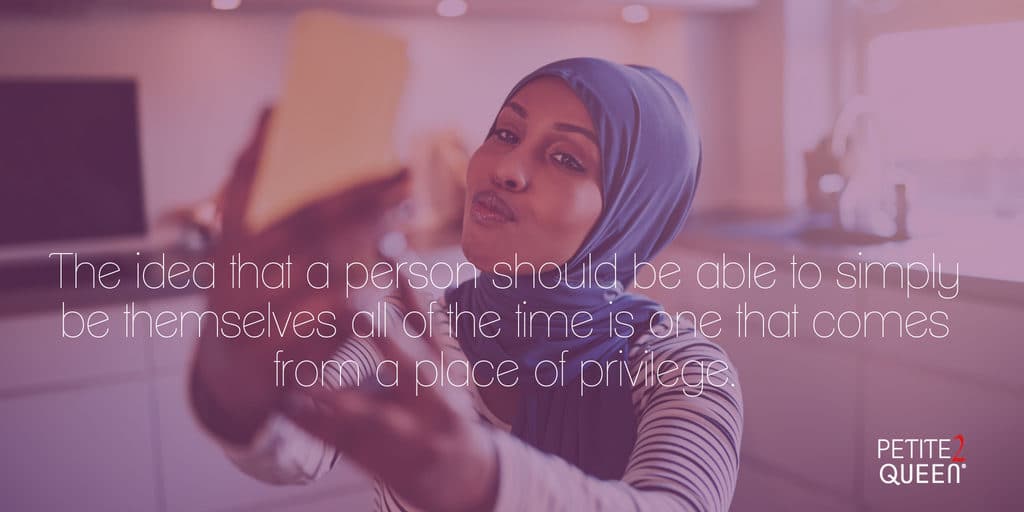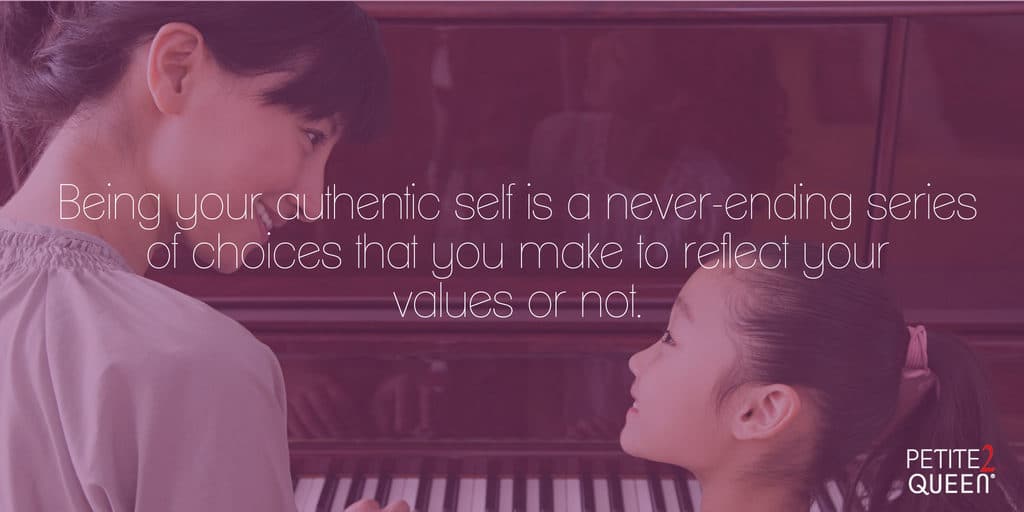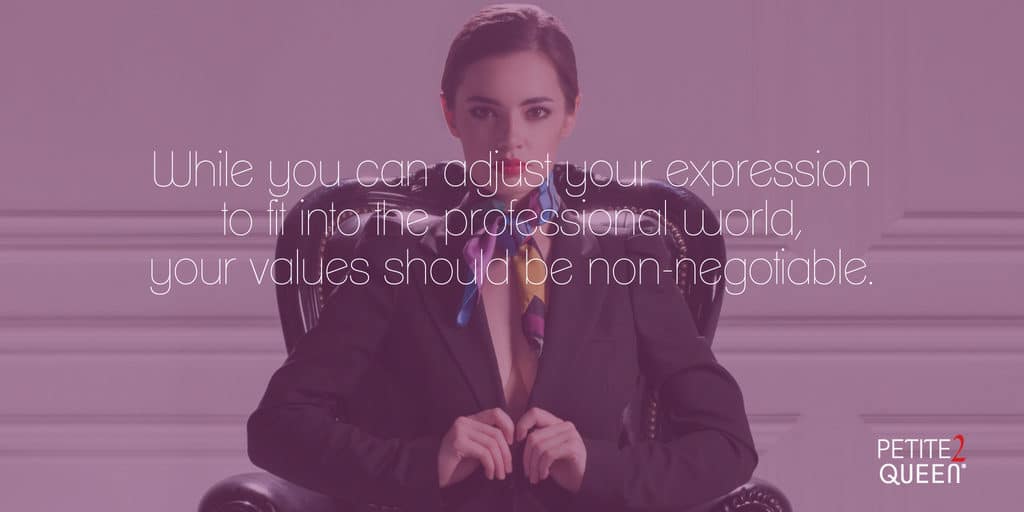If you look at inspirational moodboards or research life and career tips, there’s a good chance that you’ve come across the call to be your authentic self and to always be true to who you are. While this rallying cry has its problems – which I will discuss – there is something to be gained by living honestly. How you define your “authentic self” is up for debate. Whoever she is, she should be your guide in all parts of your life.
Authentically Out of Touch?
The concept of being your “authentic self” has had quite the heyday during the 2010s. Social media gurus, inspirational speakers and authors, and Pinterest images have been urging us to be true to ourselves and break free from conformity. While it’s a nice sentiment, in truth, the message can be pretty opaque. This kind of discourse strikes some, myself included, rather detached from reality and very privileged.
What do I mean? Certainly, there are articles that are self-aware when they speak about the authentic self. Overall, though, the conversation feels like little more than a rehash of everything we’ve been told since childhood through media.
But not only is the “authentic self” concept unoriginal, it’s completely out of touch with the reality of many people. The idea that a person should be able to simply be themselves all of the time is one that comes from a place of privilege. “Being yourself” can mean the loss of employment or even loss of safety for a lot of people. Having the wrong gender, sexuality, or religion – and letting people know about it – can spell disaster.
All of that said, let’s talk about being your authentic self.
Remember Who You Are
This is the part where tell you to be yourself anyway. We can all recall Mufasa telling Simba to “remember who you are” or his true identity – in this case, the rightful king – and act accordingly. Sadly, most of us are not secret royalty. Also sadly, for many of us, the trick is not to remember who we are, it’s to figure it out in the first place.
How do you do that? Well, it depends on who you ask. Some people talk about your essential, spiritual self. This is who you are underneath your thoughts, feelings, and identities. Maybe this resonates with you. If so, do what you need to do to discover this true self – meditate, pray, hike, journal – whatever gets you there. Personally, though, I fail to see what a person is besides their thoughts, feelings, and identities.
For some people, “identities” are vital to their self-understanding. Minorities tend to consider their identities to be of utmost importance in understanding who they are. Immigrants, queer people – anyone who is often treated worse because of some aspect of their identity – tend to consider those aspects foundational to their “true selves.” People who are part of the majority population on all counts frequently don’t.
As a queer person, I definitely consider certain aspects of my identity to be necessary for understanding my authentic self. However, I don’t consider them to be sufficient. I don’t imagine other people do, either. That would be rather one-dimensional, right? There must be more.
I offer values as the key ingredient to your authentic self. Ultimately, I see the authentic self as the self we want to become. She is someone who consistently reflects our values and never compromises them. For me, the best way to find out who you “really” are is to identify your values and then to prioritize them. Perhaps you value generosity, honesty, and loyalty. Which is most important to you? Do you think honesty is more important than loyalty and loyalty more important than generosity? Your values will guide you to be a person you are proud of and who you feel comfortable as.
How to Be You
So, you’ve figured out (or remembered) who you are. Congratulations, but you’re not done yet. Indeed, you’ll never be “done” with this step. Being your authentic self is a never-ending series of choices that you make to reflect your values or not. Of course, put that way, being your authentic self sounds so easy, right?
Nothing is ever that easy, though. Standing up for what you think is right often means putting yourself at some kind of risk, major or otherwise. Perhaps you value honesty, and someone asks your opinion on the proposal they just presented at a board meeting. Telling the truth that you think the idea is flawed puts your relationship with that person at risk, or at least you might think so. Or maybe you were in that meeting but were too shy to speak up and point out weaknesses or ask follow-up questions. Those decisions can be difficult. And, of course, if you value loyalty or harmony above honesty, then those would be different decisions.
Speaking of honesty, being your authentic self means being honest about who that is and what your values are. But, of course, being white, that’s easy for me to say. I’m relatively privileged and, even though I’m queer, I’ve never been in a community that takes issue with that. In my example above, I was using values as the example but, as I said, identities are also important to a lot of people. Being upfront about those identities can be difficult or dangerous. Even if we’re limiting ourselves to values, your value of equality could put you at risk if you call someone out for being discriminatory. In so doing, you might even out yourself.
Filtered Authenticity
Authenticity is honesty, but not unfiltered honesty. You get to highlight different parts of yourself and present yourself differently in various situations without being “inauthentic.” Being true to yourself does not mean being obnoxious and inconsiderate. It means presenting yourself in ways that are appropriate to the situation without contradicting your core values and identities.
For example, you shouldn’t loudly lecture your boss about an instance of prejudice in front of everyone, which you might do to a bigot on the street. Depending on your relationship with her, you might choose not to say anything at all to her if you think it would put your livelihood at risk. However, in this situation, you should not agree with her or condone her behavior because that would be contrary to your values and therefore inauthentic. But, again, that’s easy for me to say. Perhaps you live in an area where those particular beliefs are widespread and expected, and disagreeing might put you at risk.
This leads me to my final point. Certain people, places, and institutions might work to suppress and oppress parts or all of your true self. Living completely authentically is only possible when either you risk their wrath or you are free from their influence. The former is noble and brave, but staying safe is extremely important. If you are able, extricate yourself from those people, places, and institutions that make you being you dangerous or impossible. If you are unable, never let anyone tell you that you’re being inauthentic because you’re being safe. Remind those people to check their privilege.
Don’t Check Your Truth at the Office Door
As I said, encouragements to be your authentic self, while generally well-meaning, often come from a place of privilege. This is especially the case when it comes to the workplace. While many companies are genuinely accepting and welcoming of all kinds of people, the fact is that most corporations are exclusively profit-driven; your authentic self will only be tolerated if it isn’t perceived as lowering profits.
Consider the dress code. When I worked at an office in Washington, DC, my bosses were generally permissive in what I could wear and allowed me to show my tattoo. However, because my role put me at the front desk, I was prohibited from dying my hair any unnatural color, which I had done before as an expression of my creativity and queerness. Pink hair, in the bosses’ eyes, would give visitors the impression that we were unprofessional and therefore lose clients.
Pink hair is one thing, but what about natural hair? American society often classifies natural African hair as unprofessional – afros are not for the office. At least, some offices. This isn’t prohibiting you from changing something about your appearance. It’s requiring you to cover up a part of your identity and authentic self.
Hostile Workplaces
If a company is forcing you to compromise a significant aspect of yourself, it’s time to take a hard look at your employment there. Perhaps it’s time for you to find a new professional home. But, again, that takes a certain level of privilege. In rural areas, certain fields, and different education credentials, changing jobs becomes far more difficult – especially moving to a job that allows you to be you.
Whether you’re happy with your organization or are looking for an out, try to always maintain your core values. While you can use different vocabulary and wear different clothing to fit into the professional world, your values should be non-negotiable. Even if you can’t lecture your boss about bigotry, you should do what you can to instill your value (in this example) of equality into your work culture. Never let your co-workers forget where you stand on important issues.
As always, however, do what you need to do to maintain your health and safety. If, for whatever reason, you feel that you must pretend to agree with something you abhor in order to maintain your job, do so. Just remember that 40 hours each week is a large chunk of time to spend suppressing yourself. Make sure you can fully express your true self elsewhere. Make Mufasa proud and remember who you are. And keep an eye out for a better opportunity where your authentic self can flourish.
Truly Living
Being your “authentic” self can mean a lot of different things to different people. Whether that’s measured by how in tune you are with your spiritual side, focusing on one of your identities, or staying true to your values, we all have ways to express ourselves authentically. Once you’ve uncovered what feels authentic to you, actually being authentic becomes your action: Each day we make choice about how to behave or respond, and it is those decisions that allow us to live authentically. Be careful about expressing yourself – certain people may take issue with your true self, and you may want to avoid putting yourself into awkward or dangerous situations. But with a supportive group around you, being your authentic self will be a rewarding journey that can lead to greater life satisfaction.
Petite2Queen provides virtual mentoring to young women in life, at work, and in sales. Follow us for more practical advice you can put to use to improve your life and career.

Rachel Whitbeck is the Director of Content at Petite2Queen. She is working towards her PhD in Sociology at the University of Limerick in Ireland. Rachel uses her experience in writing, editing, and research to develop content that appeals to and is reflective of the diverse millennial woman.





Comments 1
Excellent article, Petite2Queen and Rachel Whitbeck!
I especially like how you caution people to be realistic and safe as well, when being authentic.